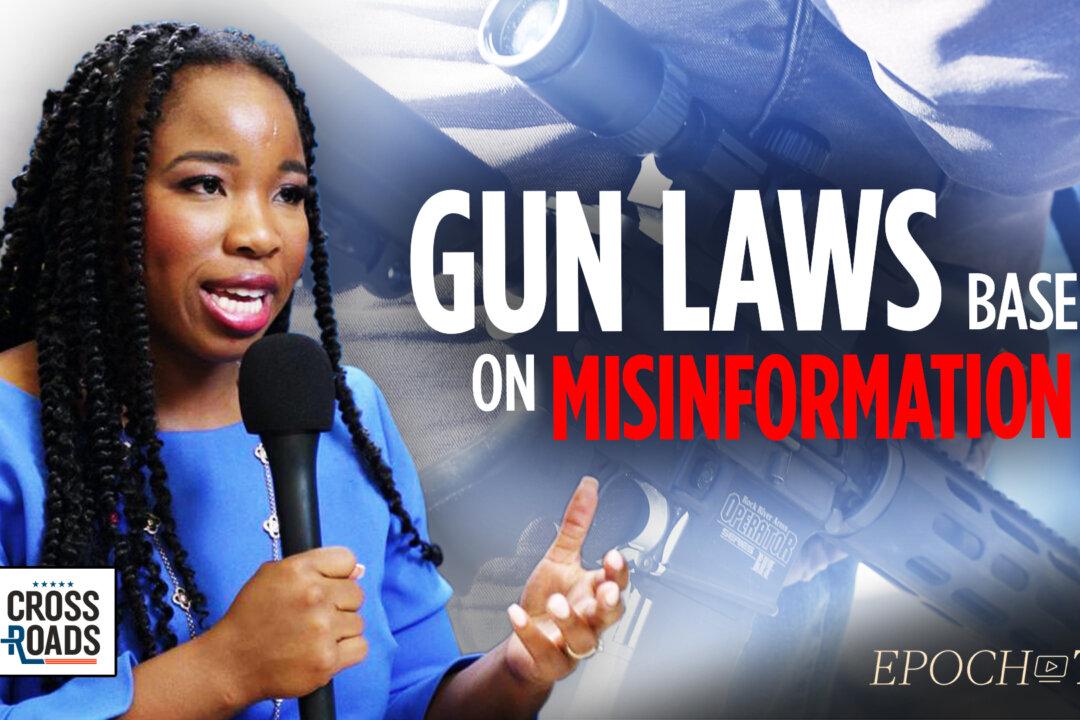For years now there has been an upward trend in women becoming first-time gun owners, a trend that has only increased in the wake of the COVID-19 pandemic. With eight million new gun owners nationwide, it’s especially fitting that “Crossroads” host Joshua Philipp interviewed Antonia Okafor, the director of outreach for Gun Owners of America, for his show titled “Anti-Gun Narratives Driven by ‘Intentional Misinformation’ and Political Interests.” Okafor, a native Texan, is the founder of Empowered 2A, a nonprofit organization with a mission of teaching women to advocate for gun ownership. Empowered 2A has now been rolled into Gun Owners of America (GOA) as the “woman’s arm,” and along with it Okafor has been added as a member of the organization, much to their credit. She has recently been moved to the position of director of outreach for the GOA and, after listening to the interview, it’s obvious why they picked her to fill the position.
While many may think of the NRA (National Rifle Association) as the first line of defense against anti-gun legislation, Okafor states early on that GOA is a much more hardline organization when it comes to protecting the Second Amendment. They see the Second Amendment as it was originally intended, cutting away the home defense and hunting narratives that are commonly used to argue the public’s right to keep and bear arms (and that are often twisted by media pundits into the counterargument that no one needs 100 rounds to shoot a deer). GOA argues instead that the citizens’ rights to firearms are for the purpose of overthrowing a tyrannical government if necessary, though Okafor certainly doesn’t advocate for any kind of revolt. What she is advocating for is protecting ordinary Americans’ ability to defend themselves against any threat, as the Founding Fathers intended.
To do this, GOA is working hard to change and repeal gun control laws at the state and local levels in anticipation of having to push back at an increasingly overreaching federal government. According to Okafor, one of their main goals is to pass laws allowing for Constitutional Carry, which has just passed in Texas. Okafor explains that Constitutional Carry is the right to carry a gun without a permit, something that is now legal in nearly half the country. The media and authoritarian left will always try to spin this as returning us to the days of the Wild West where anyone could have a gun without having to prove they aren’t a hardened criminal, but what Okafor describes isn’t that at all. Rather, what GOA is advocating is the right for law-abiding citizens to own firearms and carry them wherever they please without having to jump through additional legal hoops to obtain a permit, such as logging in a certain number of hours at a firing range or sitting through a lengthy and expensive gun safety course before they’re allowed to carry a firearm. They aren’t advocating that new gun owners don’t get training, just that it shouldn’t be required by law.
Okafor and Philipp discuss some of the federal government overreach that is working so hard to take away states’ rights any way they can in the realm of gun control. Philipp brings up Congress’ attempts to pass legislation aimed at holding gun manufacturers accountable for gun deaths by allowing them to be sued, something that Okafor immediately pinpoints as a slippery slope to opening other industries to lawsuits as well. Any number of industries could fall victim to follow-up legislation using this kind of law as precedent, regardless of what their product was intended to do. It isn’t difficult to imagine the scenarios Okafor hints at with her analysis of these laws such as car manufacturers and alcohol distilleries getting sued for the damage done by drunk drivers; knife manufacturers sued for stabbings; or rope manufacturers sued for suicides by hanging. We’re a litigation-happy country already, and opening up businesses to liability for death and injury caused by their product being used in a way it was never intended—like shooting up a school—is a nightmare in the making.
Okafor, in fact, spends a nice amount of time on the misnomer “assault rifle” and how gun control advocates have seized on public ignorance about firearms to spread the idea that the AR-15 is somehow scarier and more lethal than a hunting rifle with the exact same firing mechanism. Gun control advocates rely heavily on the AR-15’s look to promote it as somehow a military-grade weapon, despite the fact it’s a semi-automatic just like most handguns and hunting rifles, and that it was designed for civilians, not the military. In fact, because the AR-15 is easily modifiable to add stabilizers, it’s an ideal weapon for civilians to use as it allows for steadier aim, which makes it easier to hit your target. Here again Okafor underscores the idea that the people looking to ban guns are banking on public ignorance not only about the design of the AR-15 but the purpose of the Second Amendment. While it’s nice that the Second Amendment allows people to hunt and defend their homes, the real purpose is to give civilians the ability to overthrow a tyrannical government. Our current president may argue that it would be awfully hard for civilians to fight off a military that has tanks and F-16s with handguns and rifles, but as has been proven very recently we couldn’t manage to defeat the Taliban in 20 years, and they were not nearly as well-armed as the American population.
Philipp and Okafor dive into her relatively quick turn-around from growing up in a family with no real understanding of the Second Amendment or its purpose, to being such a strong advocate for gun ownership that she started her own organization. This portion of the interview really hits the left right where it hurts the most, since she ticks off so many boxes they find important when summing up a person’s worth. She’s the daughter of immigrants. She’s black. She’s a woman. She’s a sexual assault survivor. She brilliantly dissects the sexism inherent in the left’s narrative that guns are loud and scary and no proper lady would ever want to own a killing machine like that.
Okafor has long used her voice to advocate for colleges to allow conceal carry on campuses, which is a natural segue from her story to how she became something of a Second Amendment crusader. Playing devil’s advocate, Philipp suggests it’s insane to allow college “kids” to carry firearms, yet as Okafor points out, 18-year-olds are legally adults. We allow 18-year-olds to enroll in the military and go off to potentially die in foreign countries. We allow them to vote; we allow them to drive; we allow them to do just about everything short of running for public office and drinking. Okafor sees no reason why they shouldn’t be allowed to conceal carry firearms on college campuses when they have permits to do so off campus. She rightly recognizes higher education’s desire to prepare students to live in a nanny state where they are conditioned to expect others to take care of them and their safety.
She’s spot-on, too, in the way she highlights the left’s hypocrisy on this issue in particular, and in her decision to initially promote gun ownership to college-aged women. After all, if colleges are truly breeding grounds for rape culture (they’re not, but let’s say they are) and every man alive has an inner rapist just waiting for the right victim, why on earth wouldn’t the left want women to be as well-armed as possible to defend themselves against all the villains hiding in the bushes just waiting to jump out and assault them? Why make every woman into Blanche DuBois, dependent on the kindness of strangers to save her, rather than allowing her to carry the Great Equalizer should she find herself in a precarious position? The answer of course is that the more lawmakers can frighten women into staying away from those loud, scary guns, the easier it will be to convince them to join organizations like Moms Demand Action and to rely solely on the government for protection, rather than relying on themselves.
Philipp and Okafor close the interview again underscoring the importance of protecting the Second Amendment in its original intent. It’s not about hunting, sport shooting, or even self-defense. It’s about the ability to keep the government in its place, something that is more necessary now than it’s been since the Obama administration. The current administration’s moves toward gun control, not only in the policies they’re pursuing, but in their recently failed attempt to install an extreme gun control advocate as the head of the Bureau of Alcohol, Tobacco, Firearms, and Explosives, make this a crucial episode of “Crossroads” to watch and share.




